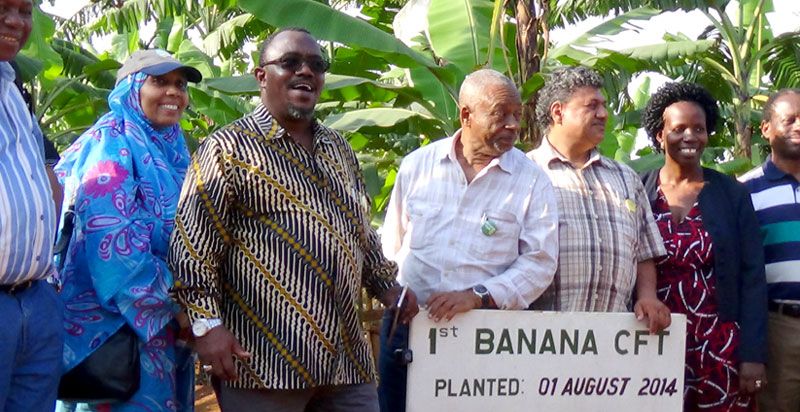
There is no more justification to delay access to life-saving modern agricultural technologies for poor farmers by ‘comfortable’ politicians and civil society activists, a prominent Tanzanian former minister has warned.
Ugandan scientists have previously expressed frustration at the government’s failure to enact a law to facilitate the commercialization of new crop varieties that are resistant to diseases, tolerant to drought and have higher nutritional value using modern biotechnology. The law has been in the works for close to a decade now.
Adam Malima, Tanzania’s former Minister of Finance and Economic Affairs in Jakaya Kikwete’s government this week led a delegation of eight prominent politicians, private entrepreneurs and supporters of new agricultural biotechnology to witness Uganda’s progress in developing crops that can address humanity’s biggest challenges of hunger, poverty and malnutrition.
Malima and most of his colleagues said they were proud of Uganda’s runaway achievements in the field of agricultural biotechnology that has made Uganda the leading African country with the most number of projects on biotechnology.
“We are policy reform advocates for systemic application of biotechnology -in agriculture. We see it as an opportunity to addressing some of the greatest obstacles to overcoming challenges in the agricultural sector.
“At Kawanda and Namulonge [agricultural research stations], we’ve witnessed phenomenal achievements in Banana research to address challenges that affect millions of farmers not only in Uganda but also in Tanzania and other places.
“We may have different interpretations of biotechnology, but for politicians and civil society to dilly dally about problems that are affecting millions of people is criminal,” said Malima.
The Tanzanian team expressed bewilderment at Uganda’s ‘outstanding’ achievement in developing both the infrastructure, human resources and knowledge towards developing new higher yielding or disease resistance crop varieties using genetic engineering.
Uganda is leading in Africa with a record number of 17 trials on biotechnology. The country also has two state of the art biotechnology labs and several dozens of experts trained in recent years on biotechnology.
Ex-Minister Malima said they had come to Uganda to learn how Uganda has succeeded and also put in place a similar loby and advocacy arrangement that will push for Tanzania’s expedited adoption and implementation of biotechnology.
The team visited a successful trial of Vitamin A-rich bananas at Kawanda which promises to overcome widespread stunting in children due to deficiency in the essential nutrient.
“Having witnessed the successful trial, Malima commented: “If scientists have proved that the new variety has more Vitamin A, who else can dispute it. Let those who dispute it bring scientific evidence to the contrary. In my view, decision makers must get out of their guaranteed comfort and go to the villages where millions are battling diseases and pests that are ravaging their crops.”
The apparent determination and sense of urgency expressed by Malima and his team points to a possible radical shift in the mindset of senior Tanzanian officials from one that was previously against the technology to one that is supportive.
A team of senior government officials from Tanzania visited Uganda in 2014 and on return to their country, they removed a prohibitive component in their laws that holds developers of biotechnology products such as crops, liable for any losses and damages people may suffer even if they are caused by environmental, human factors.
The apparent change in attitudes may be attributed to recent studies proving that biotechnology does not cause cancer, or any other disease compared to ordinary foods, as propagated by civil society activists.
Biotechnology is recognised internationally as a novel way of finding solutions to problems such as diseases that attack plants, animals and humans, raising productivity in agriculture and livestock, improving health through increasing the nutritional value of common staple foods.
While congratulating Ugandan scientists for the achievements, Malima urged them not to be obsessed by the absence of a law but rather continue to look for more solutions either using biotechnology or other conventional means.
Successful biotech trials
Scientists at the National Agricultural Research Organization (NARO) say that out of the 17 biotech trials that have been undertaken, about four crops have successfully completed major trials. These include;
The Banana Bacterial Wilt resistance variety, Cassava brown streak resistant variety, Late blight resistant Irish potato, Vitamin A bananas, Maize stem borer resistant and drought tolerant maize.














Sunrise reporter
Leave a Comment
Your email address will not be published.